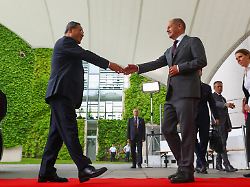skepticism about government meetings
Scholz dines with China’s Prime Minister
06/20/2023, 02:40 am
After a five-year break, members of the Chinese and German governments are meeting for talks. Chancellor Scholz receives Prime Minister Li Qiang for dinner. Meanwhile, the SPD foreign politician Roth expresses doubts as to whether the format is still up to date.
Before the 7th German-Chinese intergovernmental consultations, Chancellor Olaf Scholz and China’s Prime Minister Li Qiang and other members of the two governments have already exchanged views in Berlin. Scholz received Li in the Federal Chancellery in the evening. A joint dinner was on the agenda.
The FDP-led Federal Ministry of Finance announced on Twitter that department head Christian Lindner had productive talks with his Chinese counterpart Liu Kun. Topics were the “current challenges for the world economy” and the protection and improvement of an “international rule-based order”.
According to his ministry, Federal Minister of Health Karl Lauterbach from the SPD exchanged views with his Chinese colleague Cao Xuetao on “central health policy issues”. Federal Foreign Minister Annalena Baerbock from the Greens had a telephone conversation with the Chinese chief diplomat Qin Gang. Baerbock then explained on Twitter: “The fact that we don’t see the world through the same eyes doesn’t prevent us from honestly seeking an exchange with China. About our similarities and differences – from cooperation on the economy and climate to human rights and Russia’s war in Of Ukraine.” The German-Chinese government consultations had been prepared “intensively over weeks”.
Today’s program includes a reception for Li at the Chancellery with military honors. The heads of government and eight to nine ministers each will then take part in the government consultations, which are taking place for the seventh time after a five-year break due to corona.
Warning against propaganda appropriation
Meanwhile, the chairman of the Foreign Affairs Committee, Michael Roth, is questioning the continued existence of the young tradition. It must be checked “how sustainable the format of the government consultations with China is, which is actually only intended for particularly close strategic value partners,” Roth told the editorial network Germany (RND). The policies of the communist leadership under President Xi Jinping are “contradictory to our values and interests,” said the SPD foreign policy expert. The meeting in Berlin is “also a test run to see how many concrete joint projects we can still agree on” and how resilient the partnership is, said Roth. Unlike the last government consultations in 2018, the focus today is no longer on expanding a strategic partnership with China, but on reducing risks in the relationship.
The People’s Republic has been Germany’s most important trading partner for years. Before the government consultations, Scholz had defended the course of reducing economic dependence on China and putting Germany’s supply chains on a broader footing. The background to this is growing tensions between China and the USA in recent years, as well as the Taiwan conflict. Beijing regards the island republic as a breakaway territory, which it wants to reunite with the mainland, if necessary by force.
The vice chair of the German-Chinese parliamentary group in the Bundestag, Gyde Jensen, spoke out in favor of restraint in dealing with China. She warned the cabinet against allowing itself to be misused as a propaganda backdrop by the Chinese government: concrete positive signals for bilateral cooperation are “unthinkable as long as they are not accompanied by clear and, above all, resilient commitments by the People’s Republic of China to dealing with Russia,” said Jensen to the RND.
It is about commitments “that are not only made behind closed doors, but which the People’s Republic also records in its own official communication on the government consultations,” explained Jensen. The Chinese Communist Party is known for “the targeted propaganda use of images, gestures and joint communication”. The entire cabinet must realize this, Jensen demanded.
